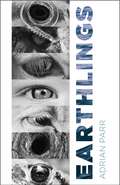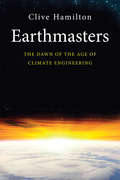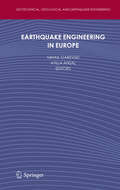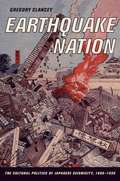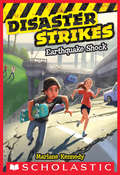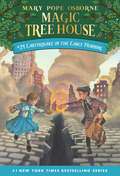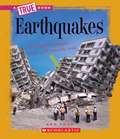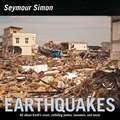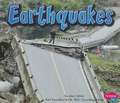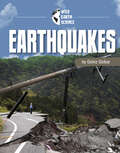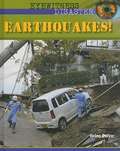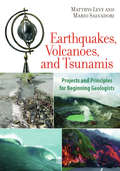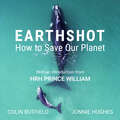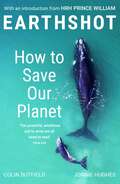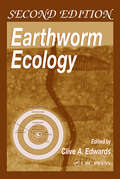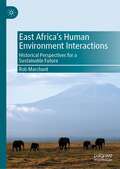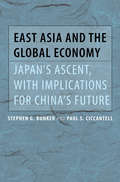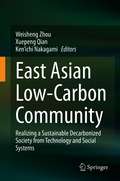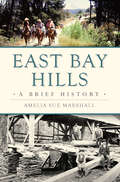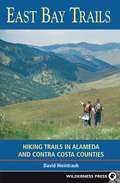- Table View
- List View
Earthlings: Imaginative Encounters with the Natural World
by Adrian ParrAmid environmental catastrophe, it is vital to recall what unites all forms of life. We share characteristics and genetic material extending back billions of years. More than that, we all—from humans to plants to bacteria—share a planet. We are all Earthlings.Adrian Parr calls on us to understand ourselves as existing with and among the many forms of Earthling life. She argues that human survival requires us to recognize our interdependent relationships with the other species and systems that make up life on Earth. In a series of meditations, Earthlings portrays the wonder and beauty of life with deep feeling, vivid detail, and an activist spirit. Parr invites readers to travel among the trees of the Amazonian rainforest; take flight with birds and butterflies migrating through the skies; and plunge into the oceans with whales and polar bears—as well as to encounter bodies infected with deadly viruses and maimed by the violence of global capitalism.Combining poetic observation with philosophical contemplation and scientific evidence, Parr offers a moving vision of a world in upheaval and a potent manifesto for survival. Earthlings is both a joyful celebration of the magnificence of the biosphere and an urgent call for action to save it.
Earthmasters
by Clive HamiltonThis book goes to the heart of the unfolding reality of the twenty-first century: international efforts to reduce greenhouse gas emissions have all failed, and before the end of the century Earth is projected to be warmer than it has been for 15 million years. The question "can the crisis be avoided?" has been superseded by a more frightening one, "what can be done to prevent the devastation of the living world?" And the disturbing answer, now under wide discussion both within and outside the scientific community, is to seize control of the very climate of the Earth itself. Clive Hamilton begins by exploring the range of technologies now being developed in the field of geoengineering--the intentional, enduring, large-scale manipulation of Earth's climate system. He lays out the arguments for and against climate engineering, and reveals the extent of vested interests linking researchers, venture capitalists, and corporations. He then examines what it means for human beings to be making plans to control the planet's atmosphere, probes the uneasiness we feel with the notion of exercising technological mastery over nature, and challenges the ways we think about ourselves and our place in the natural world.
Earthquake Engineering in Europe
by Atilla Ansal Mihail GarevskiThis book contains 9 invited keynote and 12 theme lectures presented at the 14th European Conference on Earthquake Engineering (14ECEE) held in Ohrid, Republic of Macedonia, from August 30 to September 3, 2010. The conference was organized by the Macedonian Association for Earthquake Engineering (MAEE), under the auspices of European Association for Earthquake Engineering (EAEE). The book is organized in twenty one state-of-the-art papers written by carefully selected very eminent researchers mainly from Europe but also from USA and Japan. The contributions provide a very comprehensive collection of topics on earthquake engineering, as well as interdisciplinary subjects such as engineering seismology and seismic risk assessment and management. Engineering seismology, geotechnical earthquake engineering, seismic performance of buildings, earthquake resistant engineering structures, new techniques and technologies and managing risk in seismic regions are all among the different topics covered in this book. The book also includes the First Ambraseys Distinguished Award Lecture given by Prof. Theo P. Tassios in the honor of Prof. Nicholas N. Ambraseys. The aim is to present the current state of knowledge and engineering practice, addressing recent and ongoing developments while also projecting innovative ideas for future research and development. It is not always possible to have so many selected manuscripts within the broad spectrum of earthquake engineering thus the book is unique in one sense and may serve as a good reference book for researchers in this field. Audience: This book will be of interest to civil engineers in the fields of geotechnical and structural earthquake engineering; scientists and researchers in the fields of seismology, geology and geophysics. Not only scientists, engineers and students, but also those interested in earthquake hazard assessment and mitigation will find in this book the most recent advances.
Earthquake Nation: The Cultural Politics of Japanese Seismicity, 1868-1930
by Gregory K. ClanceyA cultural history of Japanese earthquakes at the turn of the 20th century and a look at their relationship to matters of modernization. The book synthesizes Japanese architecture, science, technology, labor, and art, while making theoretical contributions to the field of science studies.
Earthquake Shock: Earthquake Shock (Disaster Strikes #1)
by Marlane KennedyWhen disaster strikes, the only thing you can count on is yourself!It had seemed like the perfect California day. But as Joey Flores walked home from the skate park with his friends, the ground began to tremble, and Joey knew they were headed for trouble....The earthquake that followed devastated their neighborhood, collapsing a nearby overpass with Joey and Fiona on one side and Kevin and Dylan on the other. Now Joey and his friends must rescue each other, endure the aftershocks, and find a new way home as the earth cracks beneath their feet.
Earthquake in the Early Morning
by Mary Pope Osborne Sal MurdoccaThe #1 bestselling chapter book series of all time celebrates 25 years with new covers and a new, easy-to-use numbering system! An adventure that will shake you up! That's what Jack and Annie get when the Magic Tree House whisks them back to California in 1906. As soon as they arrive, the famous San Francisco earthquake hits the city. Can Jack and Annie save the day? Or will San Francisco be destroyed first? Did you know that there’s a Magic Tree House book for every kid? Magic Tree House: Adventures with Jack and Annie, perfect for readers who are just beginning chapter books Merlin Missions: More challenging adventures for the experienced reader Super Edition: A longer and more dangerous adventure Fact Trackers: Nonfiction companions to your favorite Magic Tree House adventures Have more fun with Jack and Annie at MagicTreeHouse.com!
Earthquake in the Early Morning (Magic Tree House #24)
by Mary Pope Osborne Sal MurdoccaJack and Annie travel back to the morning of the great San Francisco earthquake. While they are there, they meet a reporter and help get some kids to safety.
Earthquakes
by Franklyn M. BranleyRead and find out about one of nature's most mysterious forces--the earthquake. Some earthquakes are so small that you don't even feel them, while others can make even big buildings shake! Learn why earthquakes happen, where they are most likely to occur, and what to do if one happens near you.
Earthquakes
by Ker ThanWhat makes the earth quake, rivers flood, and volcanoes blow their tops? How do natural forces become natural disasters? Buckle your seatbelts and get ready for a bumpy ride to the center of the earth for a look at some of the wildest phenomena in the history of earth science!
Earthquakes
by Seymour SimonSeymour Simon knows how to explain science to kids and make it fun. He was a teacher for over twenty years, has written more than 250 books, and has won multiple awards. In Earthquakes, Simon introduces elementary-school readers to earthquakes through engaging descriptions and stunning full-color photographs. He teaches readers why and how earthquakes happen and the damage they can cause through pictures, diagrams, and maps. He also gives real life examples of earthquakes that have occurred all over the world. This book includes a glossary and index. Supports the Common Core State Standards
Earthquakes (Let's-Read-and-Find-Out Science 1)
by Dr. Franklyn M. BranleyRead and find out about one of nature’s most mysterious forces—the earthquake—in this colorfully illustrated nonfiction picture book.Some earthquakes are so small that you don’t even feel them, while others can make even big buildings shake. Learn why earthquakes happen, where they are most likely to occur, and what to do if one happens near you. Now with updated text and art, this classic picture book describes the causes and effects of earthquakes (including a tsunami). This book features rich vocabulary and fascinating cross-sections of mountains, volcanoes, and faults in the earth’s moving crust.This is a clear and appealing science book for early elementary age kids, both at home and in the classroom. The text and art were vetted by Dr. Roland Burgmann, Professor of the Department of Earth and Planetary Science at the University of California, Berkeley.This is a Level 2 Let's-Read-and-Find-Out, which means the book explores more challenging concepts for children in the primary grades. The 100+ titles in this leading nonfiction series are:hands-on and visualacclaimed and trustedgreat for classroomsTop 10 reasons to love LRFOs:Entertain and educate at the same timeHave appealing, child-centered topicsDevelopmentally appropriate for emerging readersFocused; answering questions instead of using survey approachEmploy engaging picture book quality illustrationsUse simple charts and graphics to improve visual literacy skillsFeature hands-on activities to engage young scientistsMeet national science education standardsWritten/illustrated by award-winning authors/illustrators & vetted by an expert in the fieldOver 130 titles in print, meeting a wide range of kids' scientific interestsBooks in this series support the Common Core Learning Standards, Next Generation Science Standards, and the Science, Technology, Engineering, and Math (STEM) standards. Let's-Read-and-Find-Out is the winner of the American Association for the Advancement of Science/Subaru Science Books & Films Prize for Outstanding Science Series.
Earthquakes (Wild Earth Science)
by Golriz GolkarThe ground shakes. A road splits apart. Buildings collapse. It’s an earthquake! Discover how movement deep below Earth’s surface can cause such damage. Learn about earthquakes, what causes them, and how to stay safe if one happens.
Earthquakes!
by Helen DwyerProvides information about earthquakes through eyewitness accounts from survivors and rescue workers
Earthquakes, Volcanoes, and Tsunamis: Projects and Principles for Beginning Geologists
by Matthys Levy Mario SalvadoriWith fascinating experiments, models, and demonstrations, this scientific survey provides a vivid exploration of natural phenomena. Ideal for budding earth scientists, this in-depth resource demonstrates how to build a seismograph to record a simulated earthquake, compare pressure waves and shear waves--the two types of ground shocks--with a Slinky, and replicate a tsunami's destructive effect on a "coastline" built in a bathtub. The chapters answer questions such as Can animals "predict" earthquakes? How have various cultures explained the movement of the earth throughout history? and Why do some volcanoes ooze rivers of lava while others blow their tops? Additional topics include how to earthquake-proof homes, protect oneself during a tremor, and construct simple models to test seismographs.
Earthquakes: Nature in Motion
by Joan Lowery Nixon Hershell H. NixonDiscusses the nature of earthquakes, their causes and signs or precursors, their measurement and prediction, and what to do before, during, and after an earthquake
Earthshot: How to Save Our Planet
by Jonnie Hughes Colin ButfieldA book of action and optimism to save our planet.With an introduction from Prince William and contributions from Sir David Attenborough, Shakira Mebarak, Hindou Oumarou Ibrahim, Naoko Yamazaki and Christiana Figueres, EARTHSHOT shows us how, by working together, we can solve earth's greatest challenges.As Prince William, founder of The Earthshot Prize, said, 'The Earth is at a tipping point and we face a stark choice: either we continue as we are and irreparably damage our planet, or we remember our unique power as human beings and our continual ability to lead, innovate, and problem-solve. People can achieve great things. The next ten years present us with one of our greatest tests - a decade of action to repair the Earth.'The Earthshot concept is simple: Urgency + Optimism = Action. We have ten years to turn the tide on the environmental crisis, but we need the world's best solutions and one shared goal - to save our planet.It's not too late, but we need collective action now. The Earthshots are unifying, ambitious goals for our planet which, if achieved by 2030, will improve life for all of us, for the rest of life on Earth, and for generations to come. They are to:· Protect and Restore Nature· Clean our Air· Revive our Oceans· Build a Waste-Free World· Fix our ClimateEARTHSHOT: HOW TO SAVE OUR PLANET is the first definitive book about how these goals can tackle the environmental crisis. It is a critical contribution to the most important story of the decade.(P)2021 Hodder & Stoughton Limited
Earthshot: How to Save Our Planet
by Jonnie Hughes Colin ButfieldThe Earthshot concept is simple: Urgency + Optimism = Action. We have ten years to turn the tide on the environmental crisis, but we need the world's best solutions and one shared goal - to save our planet.It's not too late, but we need collective action now. The Earthshots are unifying, ambitious goals for our planet which, if achieved by 2030, will improve life for all of us, for the rest of life on Earth, and for generations to come.They are to:· Protect and Restore Nature· Clean our Air· Revive our Oceans· Build a Waste-Free World· Fix our ClimateEARTHSHOT: HOW TO SAVE OUR PLANET is the first definitive book about how these goals can tackle the environmental crisis, from rainforests to coral reefs, via wilderness, cities and in our own homes. It is a critical contribution to the most important story of the decade.
Earthshot: How to Save Our Planet
by Jonnie Hughes Colin ButfieldThe Earthshot concept is simple: Urgency + Optimism = Action. We have ten years to turn the tide on the environmental crisis, but we need the world's best solutions and one shared goal - to save our planet.It's not too late, but we need collective action now. The Earthshots are unifying, ambitious goals for our planet which, if achieved by 2030, will improve life for all of us, for the rest of life on Earth, and for generations to come.They are to:· Protect and Restore Nature· Clean our Air· Revive our Oceans· Build a Waste-Free World· Fix our ClimateEARTHSHOT: HOW TO SAVE OUR PLANET is the first definitive book about how these goals can tackle the environmental crisis, from rainforests to coral reefs, via wilderness, cities and in our own homes. It is a critical contribution to the most important story of the decade.
Earthworm Ecology
by Clive A. EdwardsEarthworm Ecology, Second Edition updates the most comprehensive work available on earthworm ecology with extensive revisions of the original chapters. New chapters analyze the history of earthworm research, the importance of earthworms as representatives of soil fauna and how they affect plant growth, the effects of the invasion of exotic earthworms into North America and other regions, and vermiculture and vermicomposting in Europe.This well-illustrated, expansive study examines the important and often overlooked impact earthworms have on the environment. It discusses the impact of climate, soil properties, predation, disease and parasitism, and competition upon earthworm ecology.
East Africa’s Human Environment Interactions: Historical Perspectives for a Sustainable Future
by Rob MarchantThis book is an ambitious integration of ecological, archaeological, anthropological land use sciences, drawing on human geography, demography and economics of development across the East Africa region. It focuses on understanding and unpicking the interactions that have taken place between the natural and unnatural history of the East African region and trace this interaction from the evolutionary foundations of our species (c. 200,000 years ago), through the outwards and inwards human migrations, often associated with the adoption of subsistence strategies, new technologies and the arrival of new crops. The book will explore the impact of technological developments such as transitions to tool making, metallurgy, and the arrival of crops also involved an international dimension and waves of human migrations in and out of East Africa. Time will be presented with a widening focus that will frame the contemporary with a particular focus on the Anthropocene (last 500 years) to the present day. Many of the current challenges have their foundations in precolonial and colonial history and as such there will be a focus on how these have evolved and the impact on environmental and human landscapes. Moving into the Anthropocene era, there was increasing exposure to the International drivers of change, such as those associated with Ivory and slave trade. These international trade routes were tied into the ensuing decimation of elephant populations through to the exploitation of natural mineral resources have been sought after through to the present day.The book will provide a balanced perspective on the region, the people, and how the natural and unnatural histories have combined to create a dynamic region. These historical perspectives will be galvanized to outline the future changes and the challenges they will bring around such issues as sustainable development, space for wildlife and people, and the position of East Africa within a globalized world and how this is potentially going to evolve over the coming decades.
East Asia and the Global Economy: Japan’s Ascent, with Implications for China’s Future (Johns Hopkins Studies in Globalization)
by Stephen G. Bunker Paul S. CiccantellAfter World War II, Japan reinvented itself as a shipbuilding powerhouse and began its rapid ascent in the global economy. Its expansion strategy integrated raw material procurement, the redesign of global transportation infrastructure, and domestic industrialization. In this authoritative and engaging study, Stephen G. Bunker and Paul S. Ciccantell identify the key factors in Japan’s economic growth and the effects this growth had on the reorganization of significant sectors of the global economy. Bunker and Ciccantell discuss what drove Japan’s economic expansion, how Japan globalized the work economy to support it, and why this spectacular growth came to a dramatic halt in the 1990s. Drawing on studies of ore mining, steel making, corporate sector reorganization, and port/rail development, they provide valuable insight into technical processes as well as specific patterns of corporate investment. East Asia and the Global Economy introduces a theory of "new historical materialism" that explains the success of Japan and other world industrial powers. Here, the authors assert that the pattern of Japan’s ascent is essential for understanding China’s recent path of economic growth and dominance and anticipating what the future may hold.
East Asian Low-Carbon Community: Realizing a Sustainable Decarbonized Society from Technology and Social Systems
by Ken’ichi Nakagami Weisheng Zhou Xuepeng QianThis book presents new vision of regional de-carbonization with concrete scheme design and substantial quantitative demonstration from original interdisciplinary studies. It provides new horizon for not only climate change, environmental conservation but also for international cooperation and peace in East Asia. The chapters introduce diverse low carbon society principles from local to global level with best practices integrating technology evolution and social innovation. While the book is designated for academics and the ultimate goal is to facilitate international climate regime making and environmental cooperation, local government and international organizations (United Nations, World Bank, and others) officers, researchers, international NGO/NPOs, consultants, students (particularly those studying environmental policy studies or international relationships), as well as reporters will find this book useful in broadening their understanding of low-carbon development in East Asia.
East Bay Hills: A Brief History (Brief History)
by Amelia Sue MarshallLike the mist rising from San Francisco Bay encircles the towering redwoods, the little-known legends of the East Bay Hills enrich a glorious history. Follow the trails of Saclan and Jalquin-Yrgin people over the hills and through the valleys. Ride with the mounted rangers through the Flood of ’62. Break into a sealed railroad tunnel with a pack of junior high school boys. Learn how university professors, civil servants and wealthy businessmen planned for years to create a chain of parks twenty miles along the hilltops. Author Amelia Sue Marshall explores the heritage of these storied parklands with the naturalists who continue to preserve them and the old-timers who remember wilder days.
East Bay Trails
by David WeintraubThe only guide dedicated entirely to hiking San Francisco's East Bay has been revised and updated, and features 3 new trips in Contra Costa County. Includes 56 trips for hiking, bicycling, and horseback riding on oak-studded hills, grassy ridges, rocky peaks, forested valleys, and salt-marsh shoreline. East Bay Trails is the most complete and up-to-date trail guide for Alameda and Contra Costa Counties. While the route descriptions pertain to hiking most of all, other outdoor enthusiasts-fitness walkers, joggers, equestrians, and bicyclists-will also find them useful.
